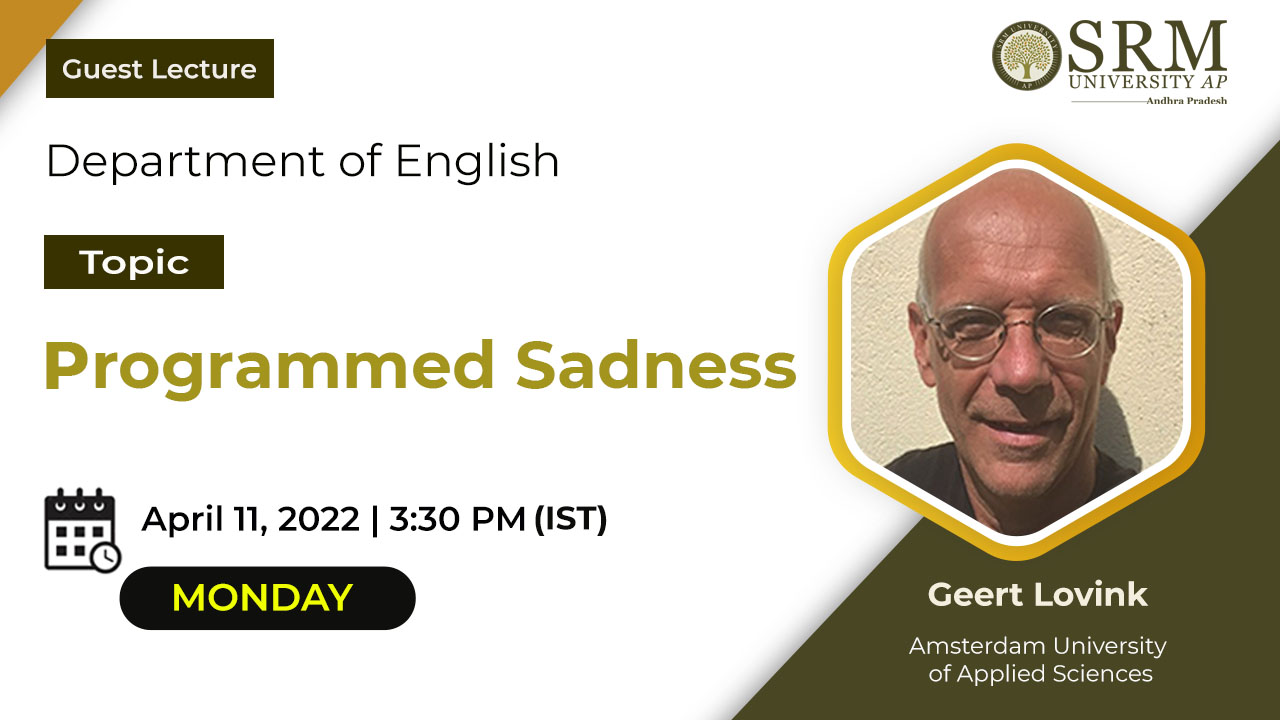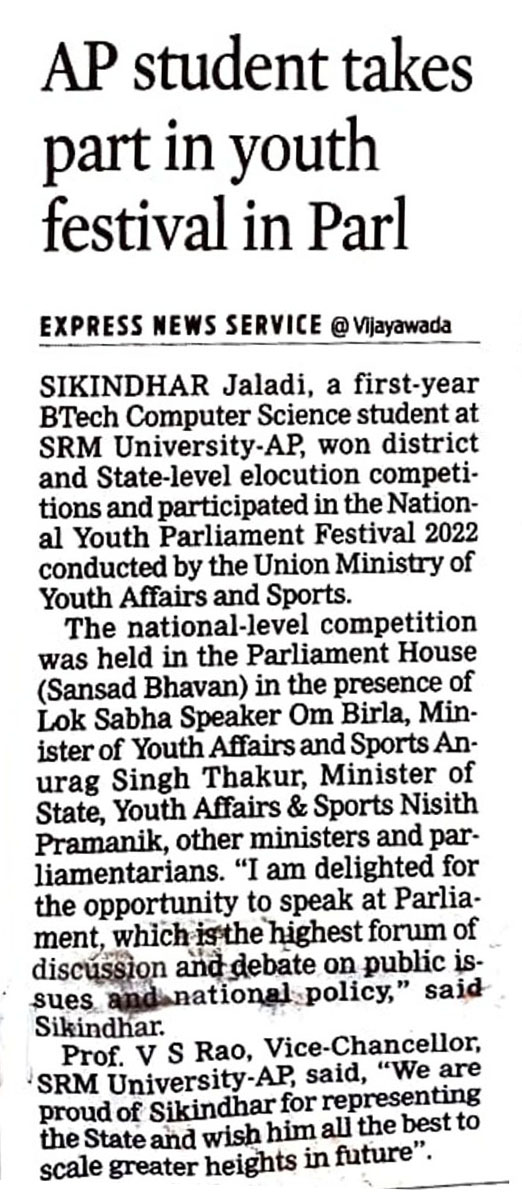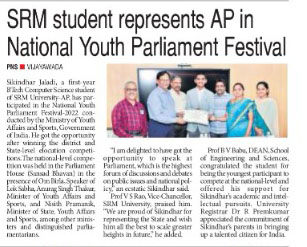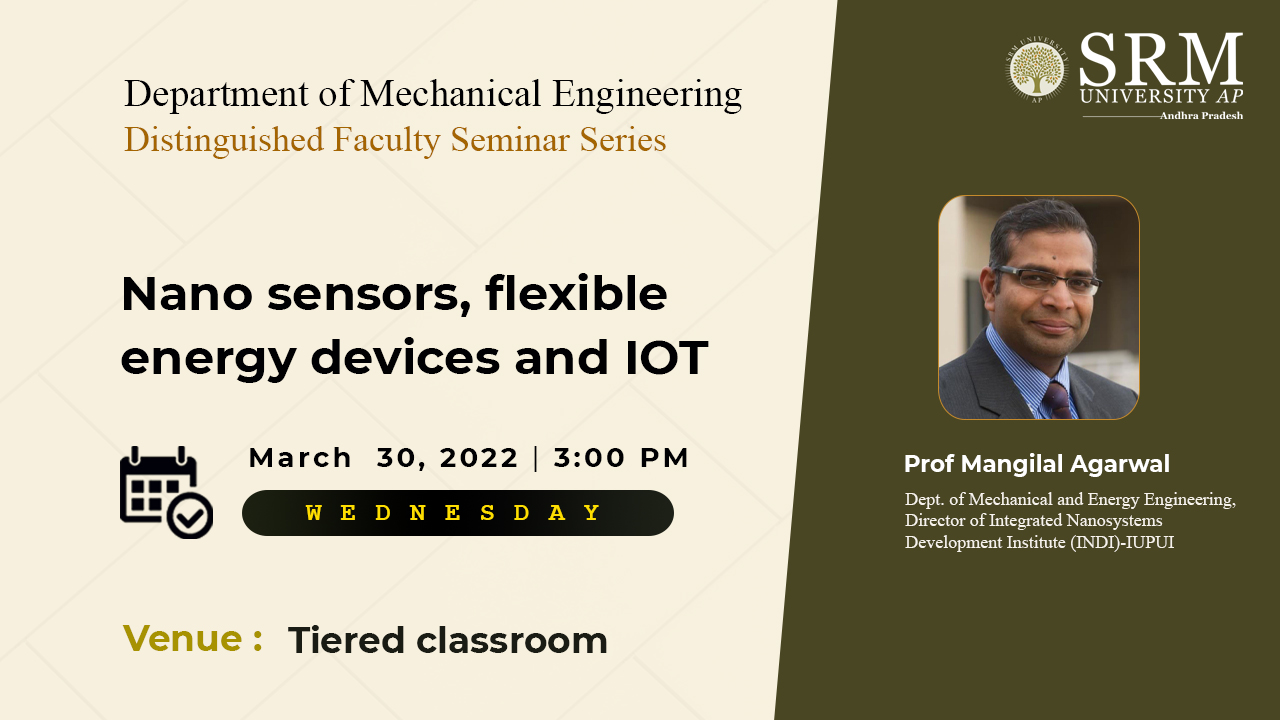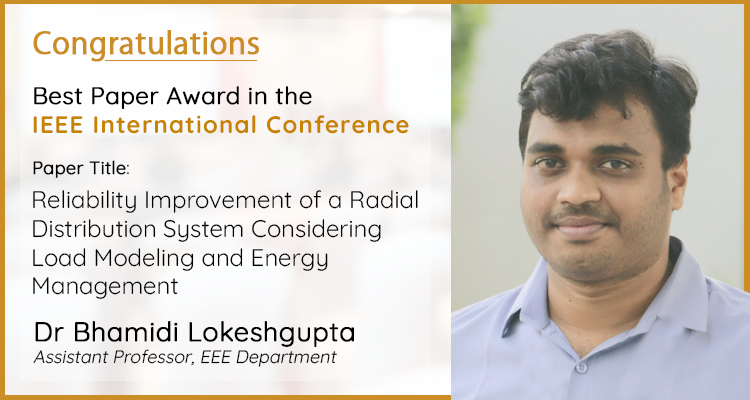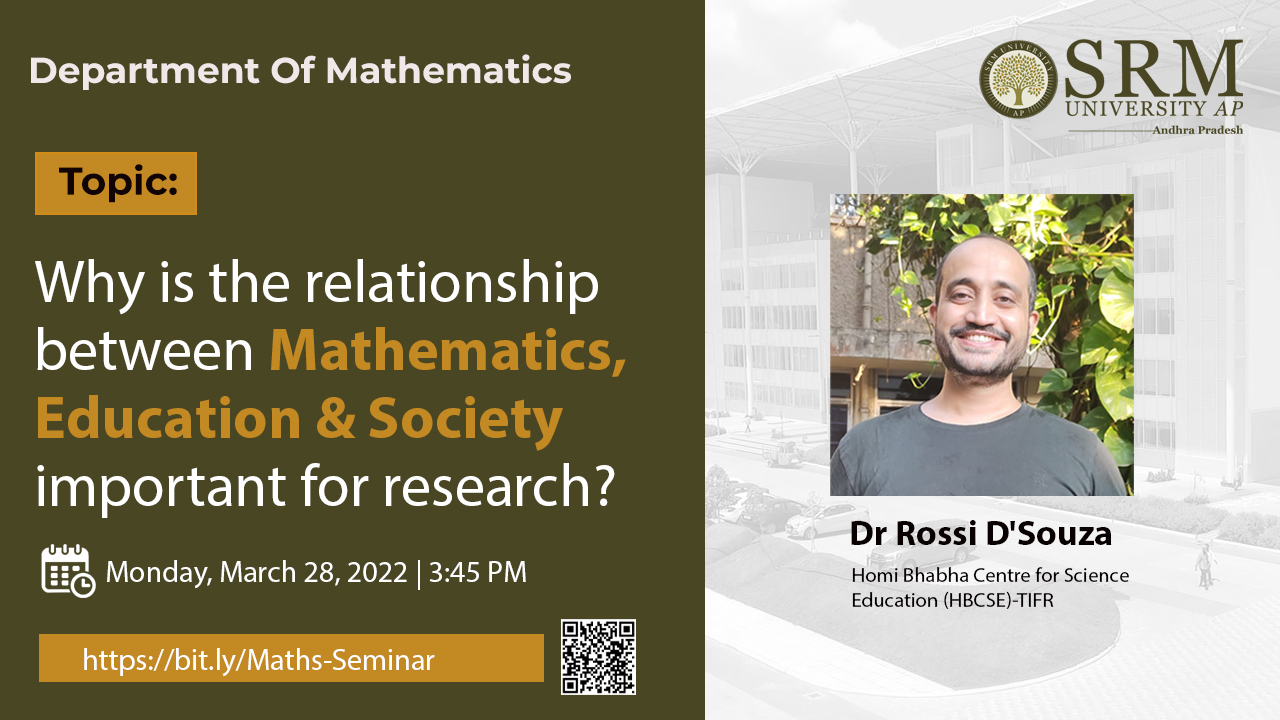All Management News
- Programmed sadness in the desire for connections and recognition April 1, 2022
“Social media reality may be seen as a magical realm where we belong. That’s where the tribes gather, and that’s the place to be – on top of the world. Social relations in “real life” have lost their importance”– David Brooks
Technological sadness has become the default mental state of the online billions. The Department of English at SRM University-AP organises a guest lecture titled “Programmed Sadness” on April 11, 2022, to discuss the emotional analytics of network cultures. Prof Geert Lovink, Amsterdam University of Applied Sciences, will engage the participants at 3.30 pm on that day.
What happens when nothing can motivate you anymore, when all the self-optimisation techniques fail, and you begin to carefully avoid these forms of emotional analytics? Compared to others, your ranking is low – and this makes you sad. In this presentation, Dutch media theorist, internet critic and founder of the Institute of Network Cultures will discuss the dark side of the net. The mental state of internet users is tragic. Instead of empowerment and self-organisation, what we mostly see around is anger and despair. How did we end up like this? The lecture will zoom in on the widespread techno-sadness that is produced by dominant social media platforms through ‘behavioural modification’ (also known as ‘nudging’) with the aim to keep users coming back to the app, exposing them to even more personalised ads. Instead of empowerment and diversity, we witness a ‘chilling effect’ of hyper conformism, resulting in anger, sadness, depression and loneliness. This is the social reality today.
About the speaker
Geert Lovink is a Dutch media theorist, internet critic and author of Uncanny Networks (2002), Dark Fiber (2002), My First Recession (2003), Zero Comments (2007), Networks Without a Cause (2012), Social Media Abyss (2016), Organization after Social Media (with Ned Rossiter, 2018), Sad by Design (2019) and Stuck on the Platform (2022). He studied political science at the University of Amsterdam (UvA) and received his PhD from the University of Melbourne. In 2004, he founded the Institute of Network Cultures (www.networkcultures.org) at the Amsterdam University of Applied Sciences (HvA). His centre organises conferences, publications and research networks such as Video Vortex (online video), The Future of Art Criticism, and MoneyLab (internet-based revenue models in the arts). Recent projects deal with digital publishing experiments, critical meme research, participatory hybrid events and precarity in the arts. From 2007-to 2018, he was a Media Theory professor at the European Graduate School. In December 2021, he was appointed Professor of Art and Network Cultures at the UvA Art History Department.
All students and faculty members are invited to join this illuminating session on April 11, 2022, at 03.30 pm via the zoom platform.
Continue reading → - SRM student reprsents AP in National Youth Parliament Festival April 1, 2022
- SRM University signs MoU with HET March 31, 2022
The Hindu – March 20

The poineer – March 20
 The Hindu – March 20
The Hindu – March 20Hans India – March 21
Continue reading →
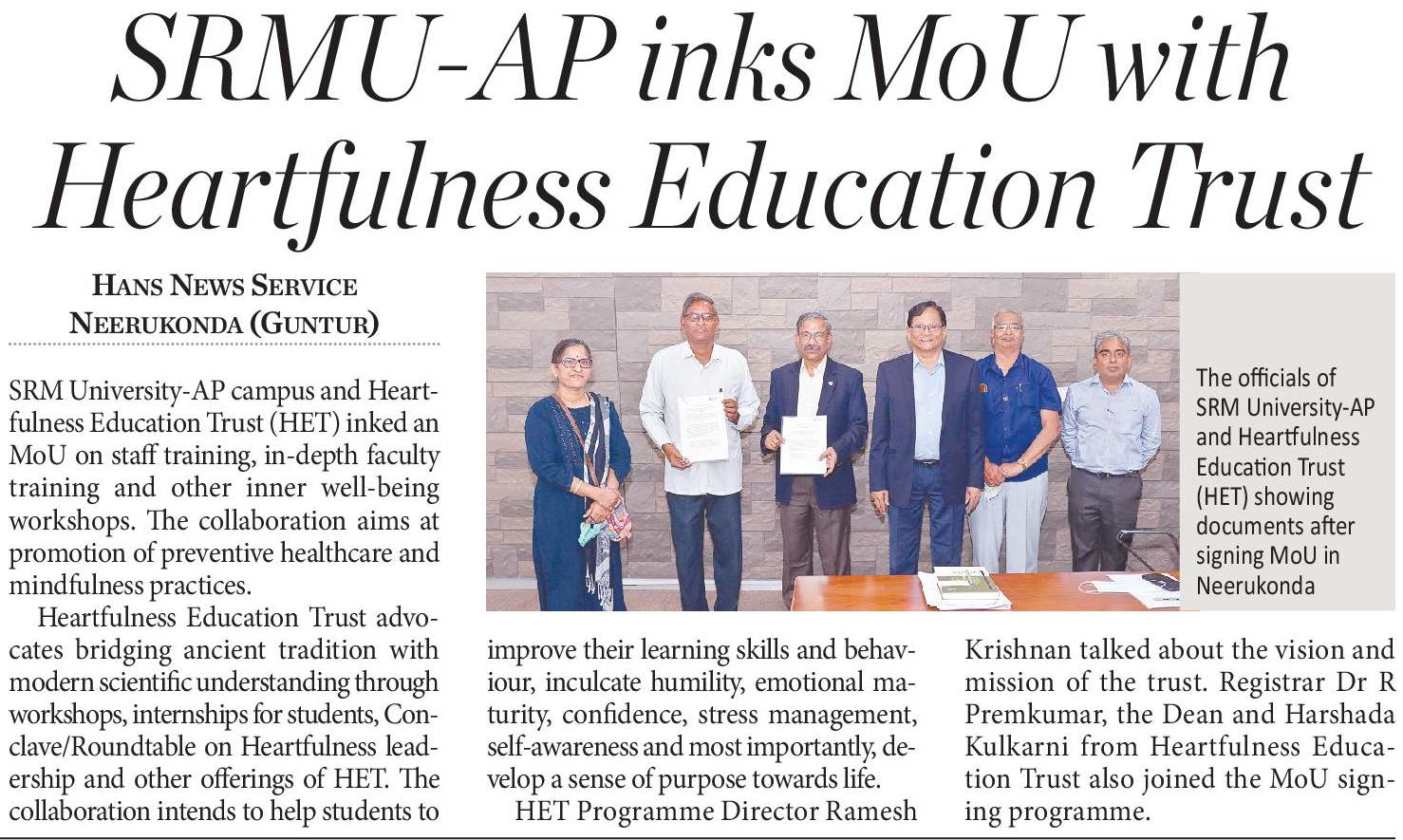
- Time to kindle scientific spirit in young minds March 31, 2022
Hans India – March 01
Continue reading →
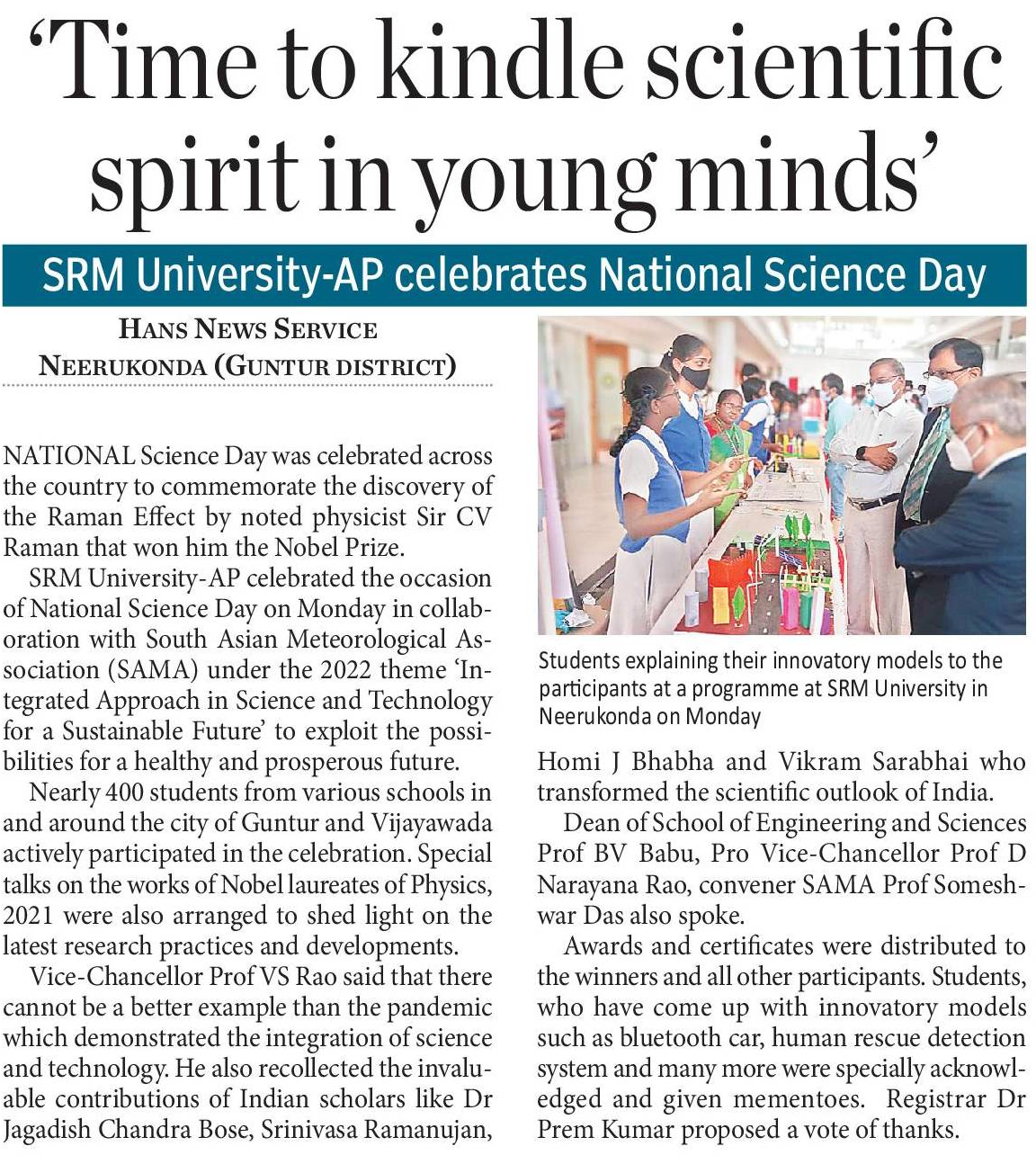
The Pioneer – March 02

- Celebrating multiple facets of womanhood March 31, 2022
The Hindu – March 09
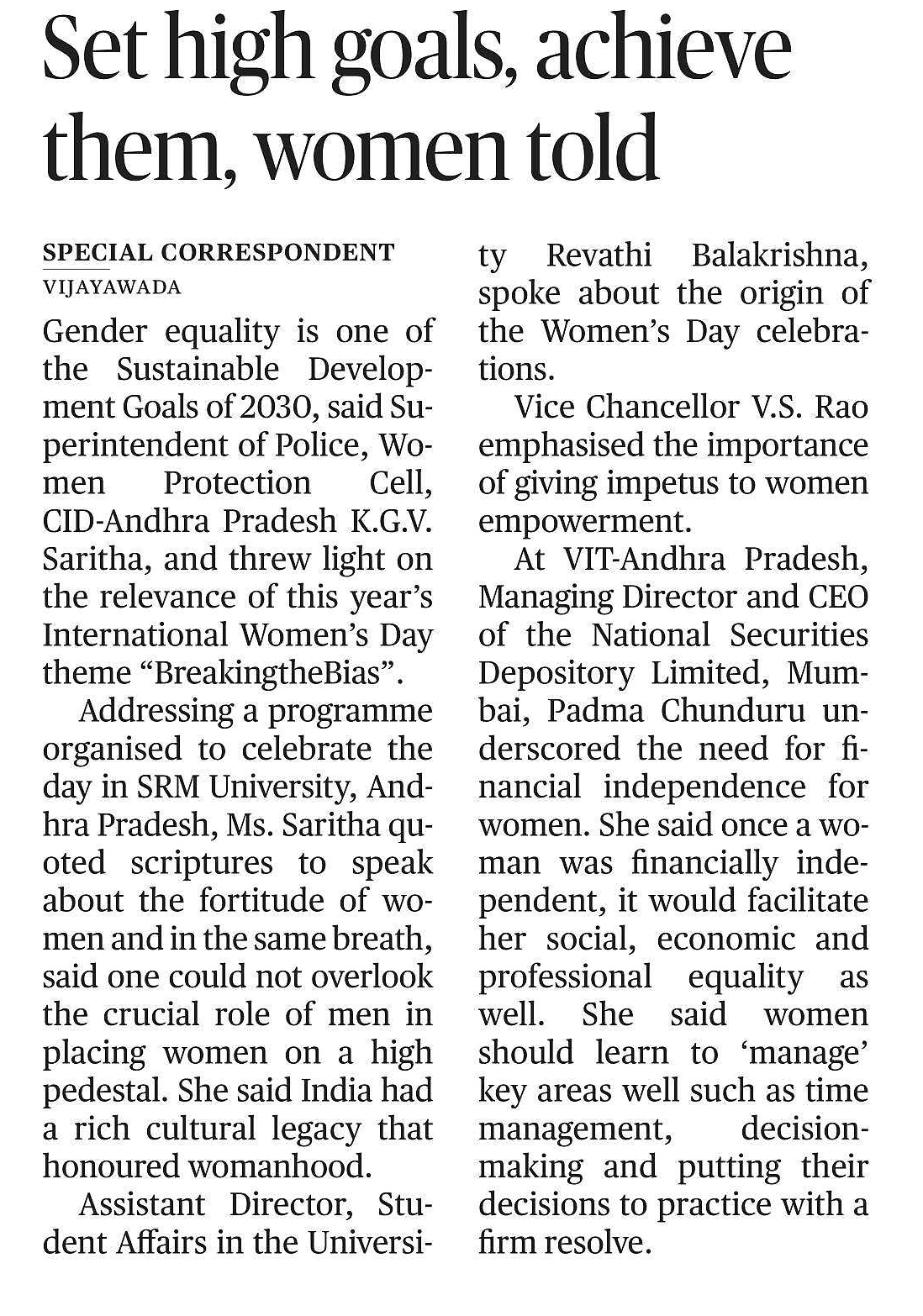
Hans India – March 09
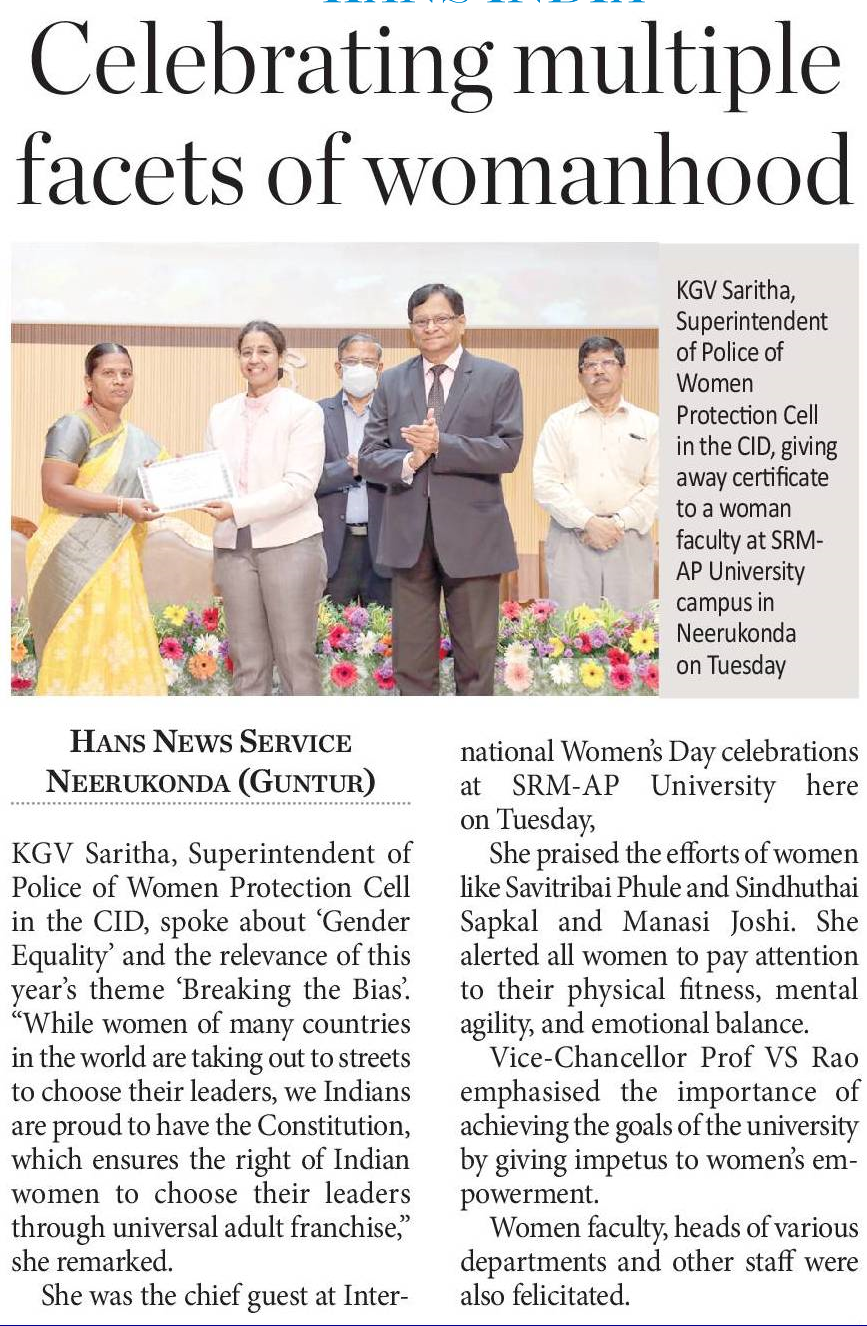
Indian Express – March 09
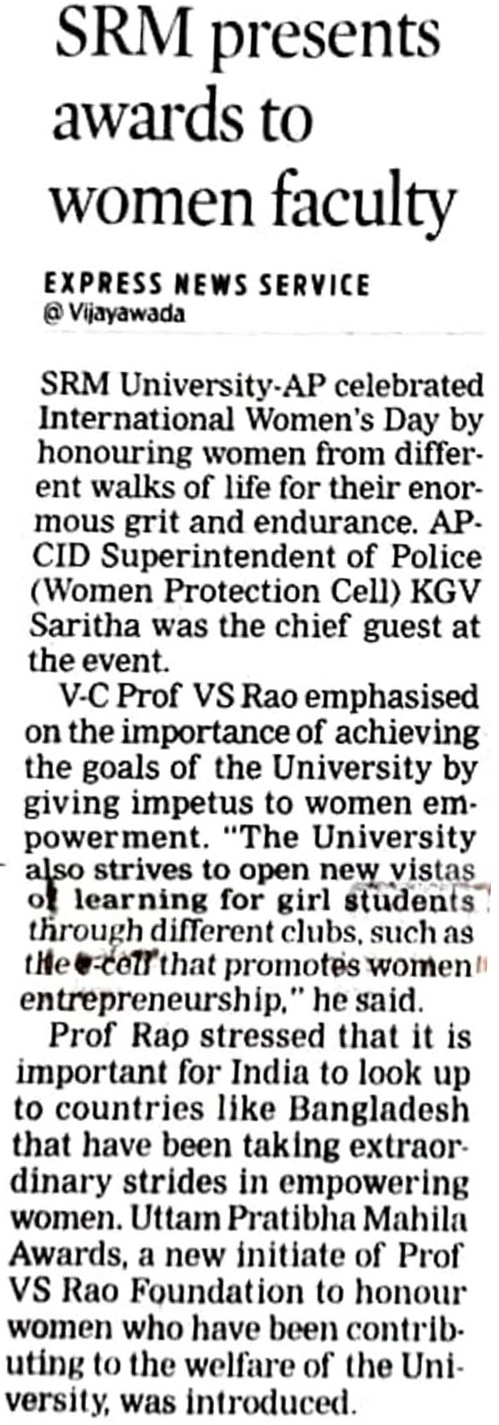
The Pioneer – March 09
Continue reading →
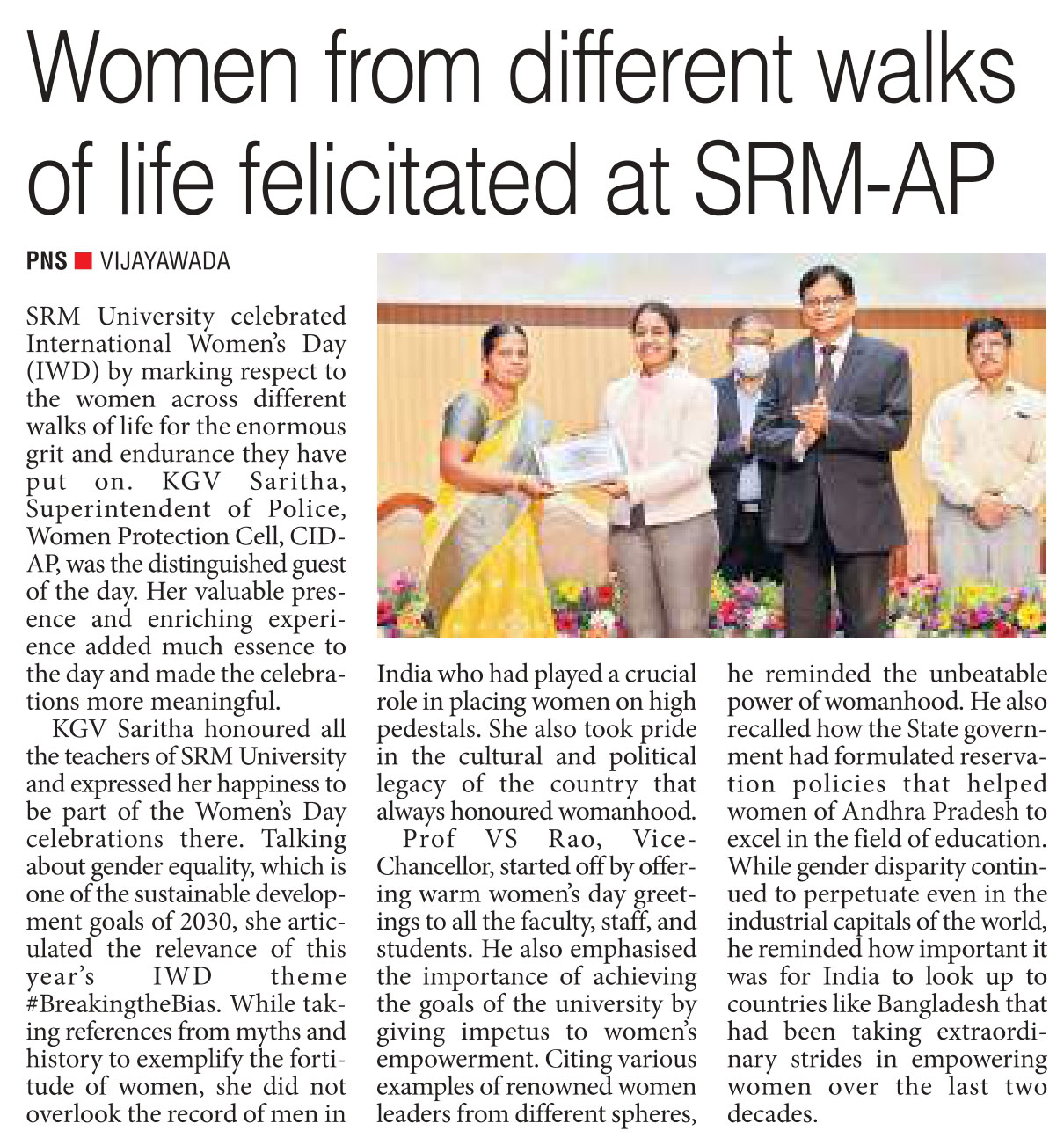
- Going green is the new fashion March 31, 2022
The Department of Commerce is glad to announce that Dr Shailender Singh, Associate Professor, published a paper titled ‘Pro-Environmental Purchase Intention Towards Eco-friendly Apparel: Extension of the theory of planned behavior model’ in the Journal of Global Fashion Marketing published by Taylor and Francis. The research is conducted in collaboration with Dr Nishant Kumar, Amity University, Noida.
Abstract of the Research
In this study, the theory of planned behaviour (TPB) model is employed with environmental concern, personal moral norms, and perceived consumer effectiveness to better predict the eco-friendly apparel purchase intention of educated Indian youths. Variance-based partial least square-structural equation modelling (PLS-SEM) is applied to evaluate the hypothesized model. Findings indicated that perceived behavioural control has a strong significant positive influence on purchase intention, followed by personal moral norms, attitude, and perceived consumer effectiveness. Environmental concern is found to indirectly affect purchase intention through three primary TPB variables and personal moral norms. Multi-group analysis (MGA) examines the moderating effect of perceived consumer effectiveness on an attitude–intention relationship. The highly perceived consumer effectiveness group is shown to have a more consistent attitude-purchase intention relationship as compared to the low-perceived consumer effectiveness group. The study promulgates insights to professionals and policymakers to formulate sustainable marketing strategies and policies to cope with the indigenous market conditions.
The textile industry has emerged as a significant pollution source owing to a rise in carbon footprint, the spike in greenhouse gas emissions, and increasing landfill waste. Sustainable fashion has become a new style statement, and industries are shifting their orientation towards environment-friendly manufacturing. A plethora of research studies have been conducted to explore consumer behaviour intention towards visiting green hotels, green products, organic food, and electric vehicles. Studies have also been done to understand consumer behavioural intention toward sustainability in apparel, sustainability, social media communication, ethical fashion consumption behaviour, and eco-friendly apparel in developed countries. However, the paucity of research studies examining the influential factors affecting purchase intention of eco-friendly apparel in a developing economy makes this study more imperative.
This study furnishes the problem by examining the eco-friendly apparel purchase intention of the educated Indian youth in the sustainable apparel framework by investigating the potential of three core predictors of purchase intention in the theory of the planned behaviour model. Furthermore, the study extends the model by adding three more variables: environmental concern (EC), personal moral norm (PMN), and perceived consumer effectiveness (PCE). Moreover, this study also examines the PCE as a moderator between consumer attitude and eco-friendly apparel purchase intention (PI), which adds to the existing body of knowledge. The study promulgates insights to professionals and policymakers to formulate sustainable marketing strategies and policies to cope with the indigenous market conditions.
Based on the proposed extended framework, the study disseminates several practical implications to attain sustainability in fashion:
(i) The strong PBC influence on apparel purchase intention would facilitate marketing professionals to support consumers with sustainable apparel choices through clear visibility, long-term benefits, and striking design with a vast form of offerings, sustainability certification, and ease of access.
(ii) It has also been observed that youth’s moral obligation to behave ethically no longer depends on social pressure. Consumers may feel that the discussion on pro-environmental intention is not having social acceptance. Policymakers must bring opinion leaders to pitch the benefit of using organic clothing so that it can be discussed socially and develop suitable sustainable purchase intent.
(iii) Marketers should use vivid marketing communication tools to educate customers about the attribute-based benefits of organic apparel and the technological difference which makes it different from fast fashion.
(iv) Policymakers should sensitize people about the deteriorating environment and try to teach pro-environmental intent through green info-commercials, organic apparel labels, socio-environmental themes in products, and affordable pricing strategies.
(v) Marketers may adopt various media platforms to showcase how individual-specific green behaviour is self-sufficient in combating environmental problems. This would increase the PCE level among people, further leading to an attitudinal shift.The Indian government can launch an awareness campaign based on the theme of environment protection through individual contributions and urge citizens to accept green as a socially accepted norm.
- Nano sensors and Flexible energy devices March 30, 2022
The Department of Mechanical Engineering is hosting a Distinguished Departmental Faculty Seminar Series to encourage discussions on diverse aspects of the subject. Experts from various fields are invited to divulge their views and help students broaden their perspectives. The talk ‘Nano sensors, Flexible energy devices and IOT’ organised as part of the series will be held on March 30, 2022 at 3.00 pm IST. Prof Mangilal Agarwal, Director of Integrated Nanosystems Development Institute (INDI)-IUPUI is the distinguished speaker of the event. The talk will focus on Identification of volatile organic compound biomarkers in breath, development of integrated nanosensor systems and electrospinning epoxy/carbon nanotubes on carbon reinforced polymers for structural applications.
Speaker’s Profile
Prof Mangilal Agarwal is a full-time professor in the Department of Mechanical and Energy Engineering, Purdue University, Indiana, USA. He has an overarching vision to become an innovative leader in high-quality research and serve industry and government agencies in Indianapolis, the state of Indiana, and beyond.
Prof Agarwal has an array of interdisciplinary research projects at IUPUI involving big data, data analytics, machine learning, analytical chemistry, and mechanical engineering. Specifically, his research consists of canine-inspired chemometric analysis of volatile organic compound (VOC) biomarkers, developing integrated nanosensor arrays that detect VOC biomarkers sensitively or selectively, and enhancing carbon reinforced materials through electrospinning epoxy/carbon nanotube composite nanofibers.
Over the years Prof Agarwal’s research has been well received and funded through numerous grants from the National Science Foundation (NSF), National Institute of Health (NIH), Department of Defense (DoD) and the industry.
Prof Agarwal has previously served as the Associate Director for Research and Development for the IUPUI Office of the Vice Chancellors for research and is currently the Director of Integrated Nanosystems Development Institute (INDI) at IUPUI, which strives to advance nanotechnology research, education, and outreach.
- Dr B Lokeshgupta received the Best Paper Award March 28, 2022
Studies that open new possibilities into some of the gripping issues in the scientific domain have transformed SRM University-AP into the epicentre of cutting-edge research and investigations. We are proud to announce that Dr B Lokeshgupta, Assistant Professor of the Department of Electrical and Electronics Engineering has won the Best Paper Award at IEEE Second International Conference on Power, Control and Computing Technologies ICPC²T 2022 held at NIT Raipur, Chhattisgarh. The paper titled “Reliability Improvement of a Radial Distribution System Considering Load Modeling and Energy Management” was co-authored by Dr S Sivasubramani and Mr. Ram Prakash from IIT, Patna. The research gives new insight into energy management and power consumption patterns.
Abstract of the Research
Increasing energy demand and recent advancements in electrical and distributed generation (DG) technology have made power systems complex. Therefore, the reliability assessment is important for efficient planning and operation of distribution networks. The system reliability can be improved with optimal DG integration and energy management schemes. This work mainly studies the impact of optimal DG planning with an energy management scheme on the reliability of radial distribution network. Usually, the reliability of a power system is evaluated using the distribution system reliability indices which are based on load point and customers. The voltage-dependent load model and time-varying load profile for different load classes are included in this work for pragmatic planning. Particle swarm optimization (PSO) algorithm is used to find the optimal site and size of DG units and optimal scheduling of the shiftable loads. The proposed model of optimal DG allocation with energy management is evaluated with a case-based analysis. The modified IEEE 33-bus distribution system is considered in this model to demonstrate the improvement of reliability and operational parameters. Simulation results verify the efficacy of the model.
About the Research
In recent decades, a high load growth rate and frequently changing power consumption patterns are observed due to urbanization and industrialization. Also, the increasing penetration of renewable-based DG has caused a significant mismatch between power generation and electricity demand pattern. This mismatch introduces reliability and power quality issues with loss of energy and revenue to the utilities in power systems. Thus, various energy management programs are carried out by utilities to encourage consumers to change their load patterns. This paper proposes a reliability improvement technique in a radial distribution system by optimal planning of disperse generation and energy management programme.
Social Implication
The research proposes an offline algorithm for the efficient planning and operation of radial distribution networks. Simultaneous deployment of distribution generation (DG) and energy management system (EMS) makes the network more reliable compared to just DG allocation. Application of DG and EMS also improves other operational parameters of the network like power loss and voltage profile.
In future, the energy management concept can be extended with the inclusion of neighbourhood power-sharing model in the environment of multiple smart home consumers and prosumers.
- Breaking the Mathematics myth March 26, 2022
Have you ever thought Mathematics is a hard nut to crack? The Department of Mathematics brings to you Dr Rossi D’Souza to break the myth associated with Math. The seminar will be held on March 28, 2022 at 03.45 pm IST. Dr D’Souza, from Homi Bhabha Centre for Science will deliver a talk on ‘Why is the relationship between Mathematics, Education & Society important for research?’.
Abstract of the Talk
“Mathematics is hard!” has been a universal refrain among school children (and often their parents) for as long as we recall. But why do so many children dislike Mathematics? Is it the way Mathematics is taught – because Math teachers follow a “rote-learning” approach instead of making sure students understand the basic concepts? Why are students from marginalized backgrounds/identities disproportionately lagging behind in & excluded from Mathematics knowledge production? Or is Mathematics really not for everybody?
Drawing on experience from his PhD research with visually challenged students and industry experience the speaker will highlight the importance of taking into account the social factors in Mathematics Education Research to effectively address the challenges posed by STEM Education – and to work towards a world where Mathematics really is for everybody!
Speaker’s Profile
Dr Rossi D’Souza recently completed his PhD in Mathematics education from HBCSE-TIFR. His research interests include exploring how ableism operates in Mathematics education. Prior to working as a Research scholar, Rossi completed his M.Tech in Modeling and Simulation from Pune University, specializing in and then working in the field of Computational Genomics. He has also worked as a visiting lecturer at Govt. Polytechnic Mumbai, as a medical instrument repairman at Narayana Hrudayalaya Hospital, Bangalore and as a Science Communicator on the Science Express train.
Join the session with Dr D’Souza and make your Mathematics learning a delightful experience.
- Raise yourselves up with the rising industrial expectations March 26, 2022
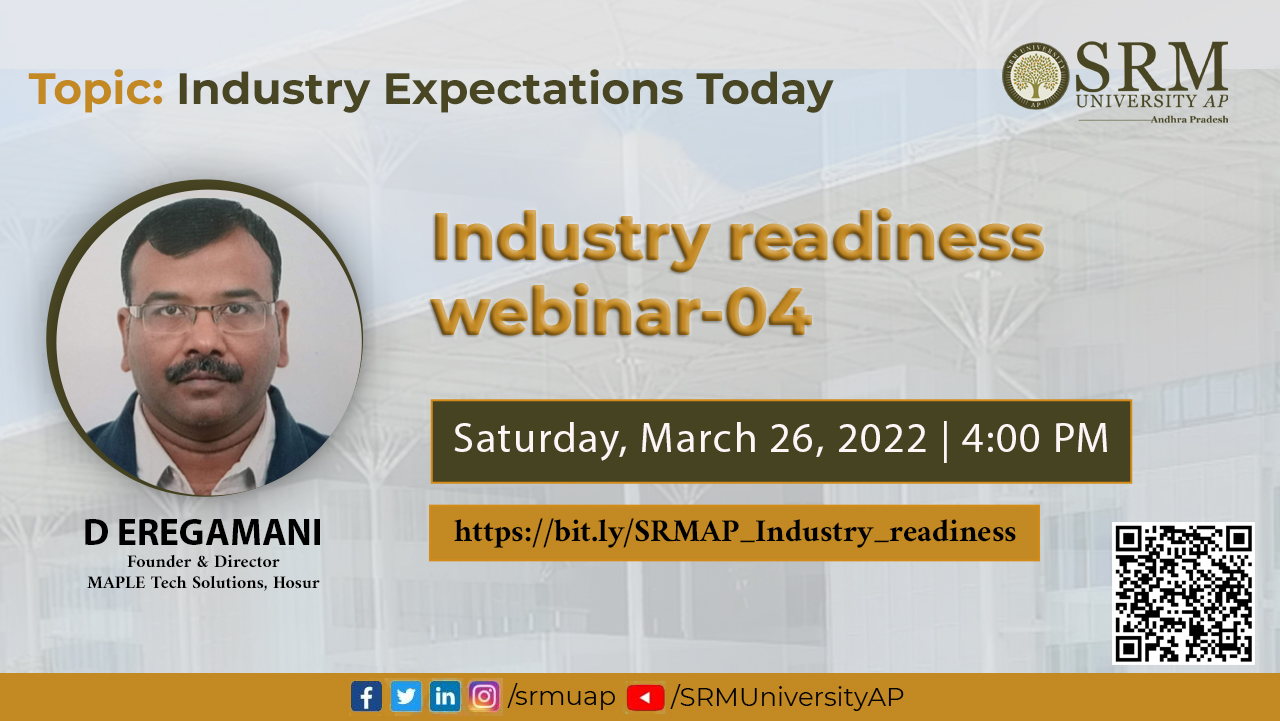 The modern business landscape is experiencing sweeping changes with each passing day, and so do the expectations in the field. Giving lessons on cutting-edge industrial practices is the need of the hour. Students should be levelled up to remain competitive in entrepreneurship and trained to keep abreast of the latest industry trends.
The modern business landscape is experiencing sweeping changes with each passing day, and so do the expectations in the field. Giving lessons on cutting-edge industrial practices is the need of the hour. Students should be levelled up to remain competitive in entrepreneurship and trained to keep abreast of the latest industry trends.The Department of Corporate Relations and Career Services is bringing forth the fourth session of the Industry Readiness webinar series on the topic “Industry Expectations Today” to give the students an extended perspective on present-day expectations in the business world.
Date: March 26, 2022
Time: 4.00 pm IST
About the Speaker:
Mr D Eragamani is the founder and director of Maple Tech Solutions, Hosur. He has 28 years of wide-ranging experience in the industrial domain. Mr Eragamani has worked as the Head of Manufacturing &TQM with major Corporates such as Titan Industries Ltd, Tyco group, TERUMOPENPOL LTD and Murugappa group.
Currently, he is running a consultancy and imparting training to industries and startups. He has gathered expertise in training by conducting workshops for MSMEs and Startups on Leadership, Business Model Canvas, Improving Leads and Digital Marketing. He has guided and judged several Quality Circle competitions.
Mr Eragamani also had the opportunity to work as an adjunct faculty in VIT School of management, NIT school of management, INDUS Business Academy, IIM-Bangalore etc. He is a member of various reputed organisations such as QCFI – Governing Council Member, Hosur Chapter; ICT Academy, Chennai; MMA, Chennai and many more. He has received numerous awards and accolades including the QCFI Platinum category award at the International forum, Taiwan and the Business Excellence award for TITAN.
Join Mr D Eragamani for a productive session and augment your possibilities of getting placed with leading companies.
Continue reading →


